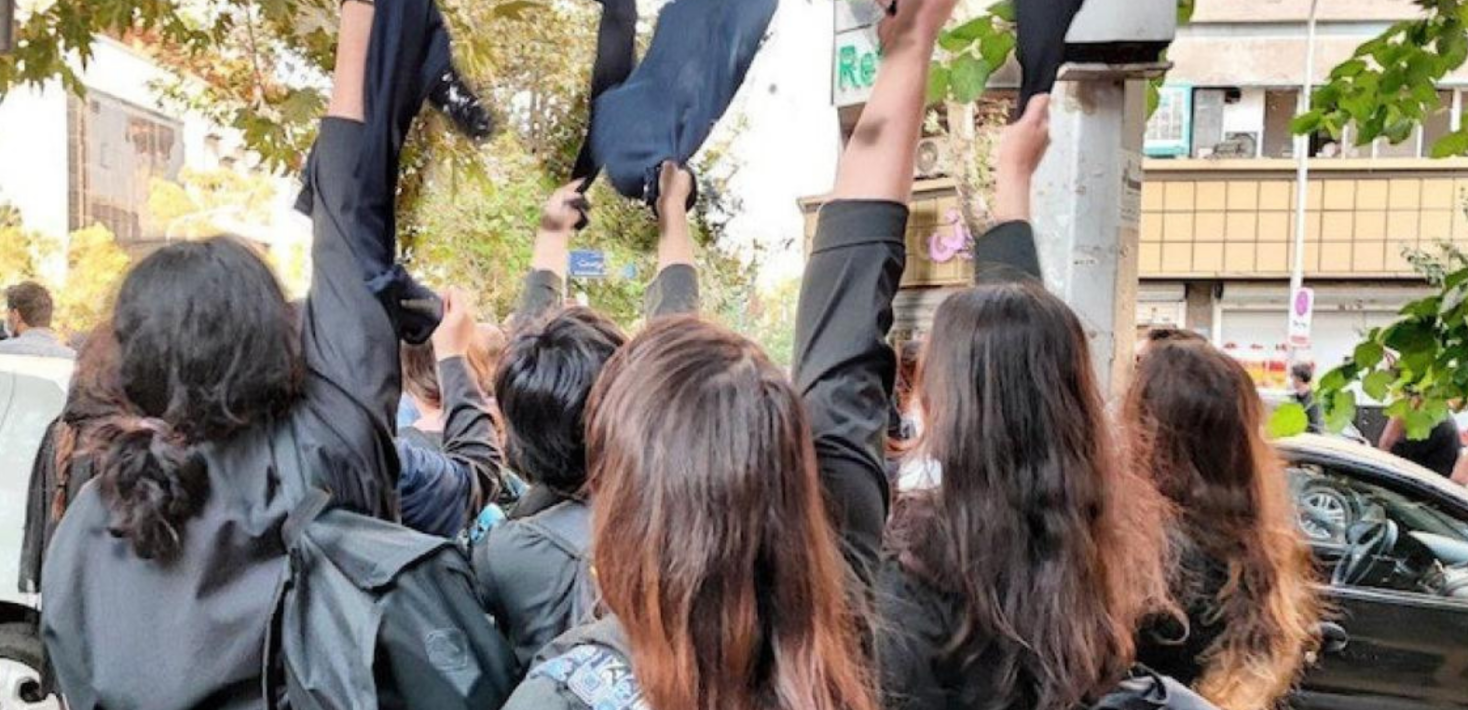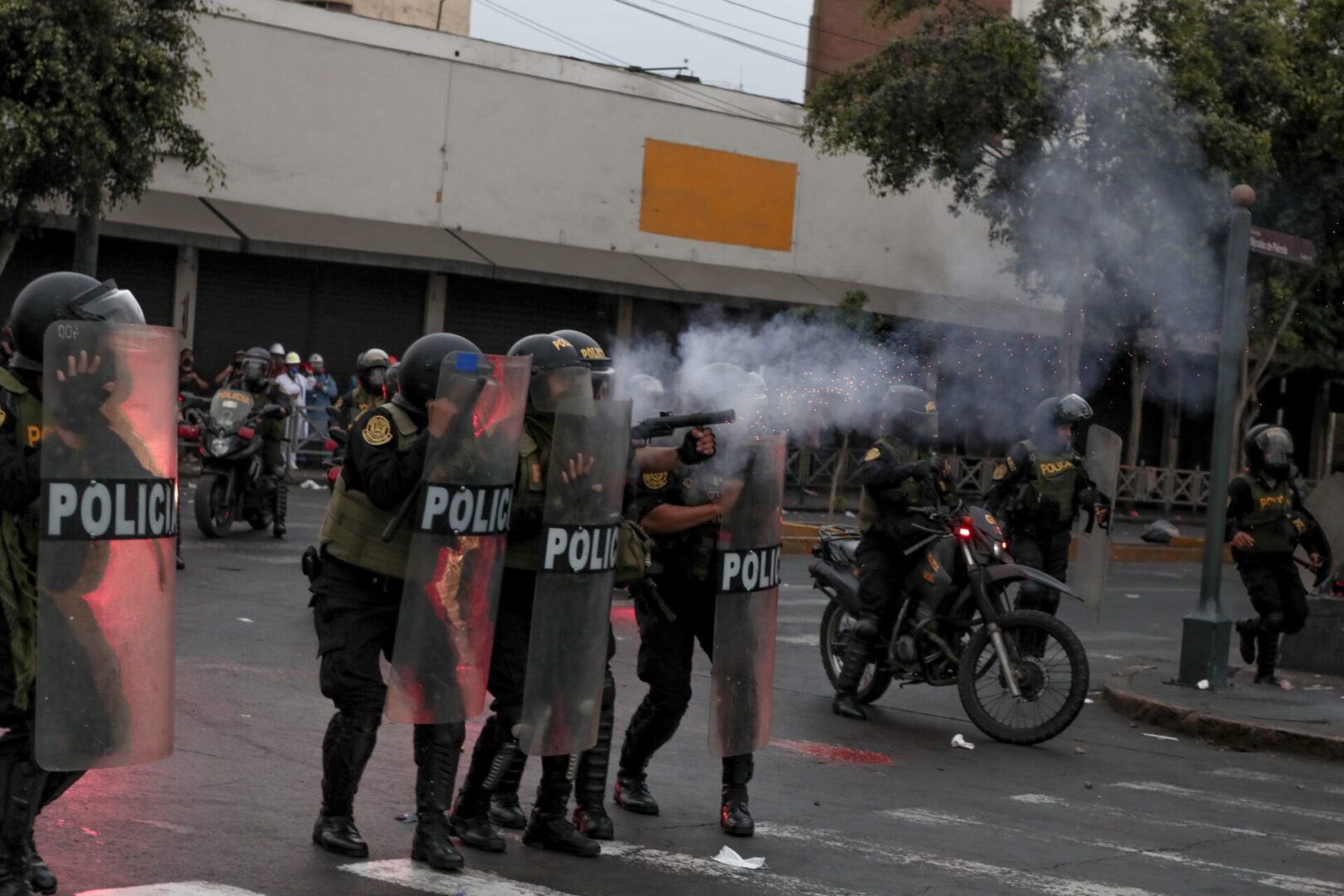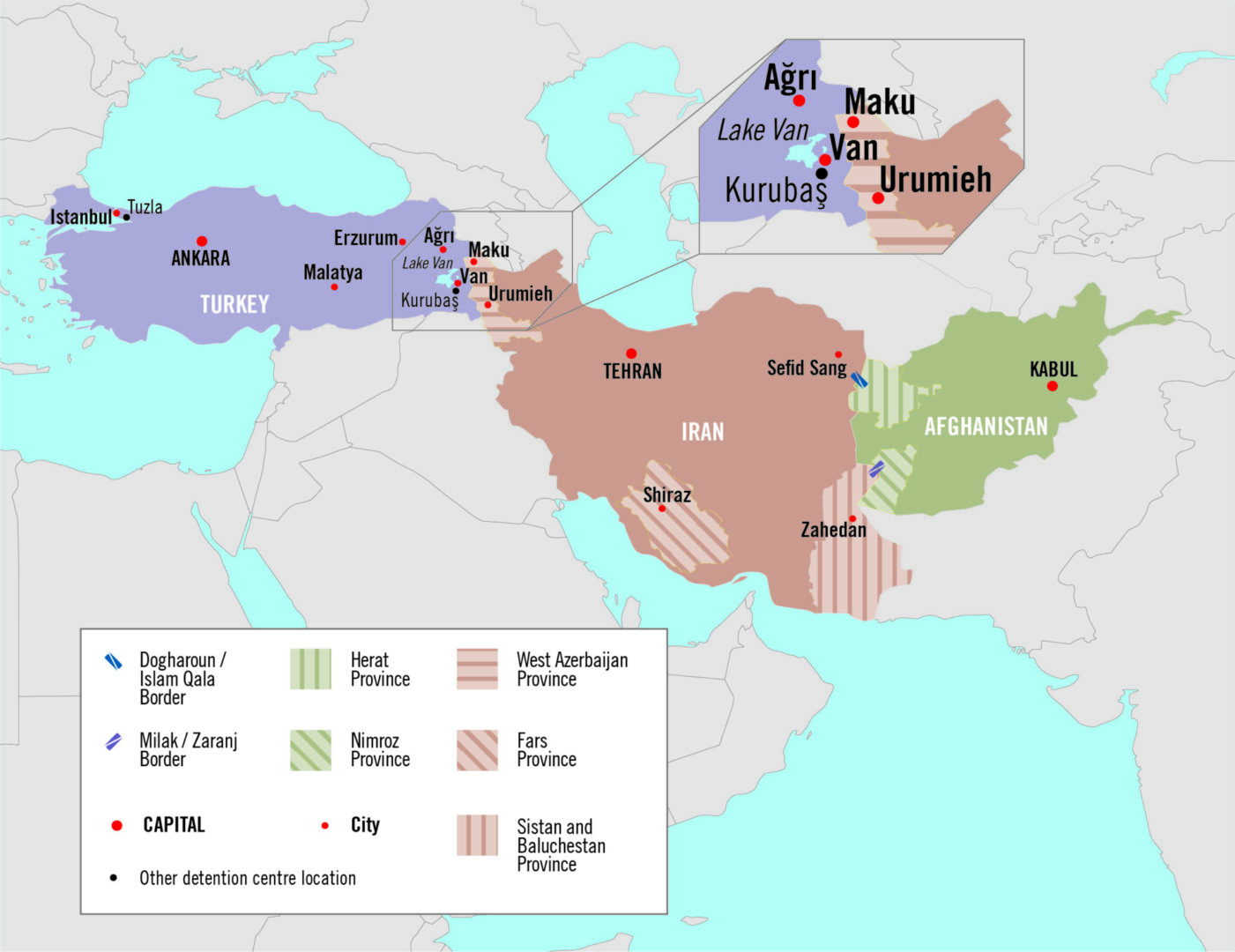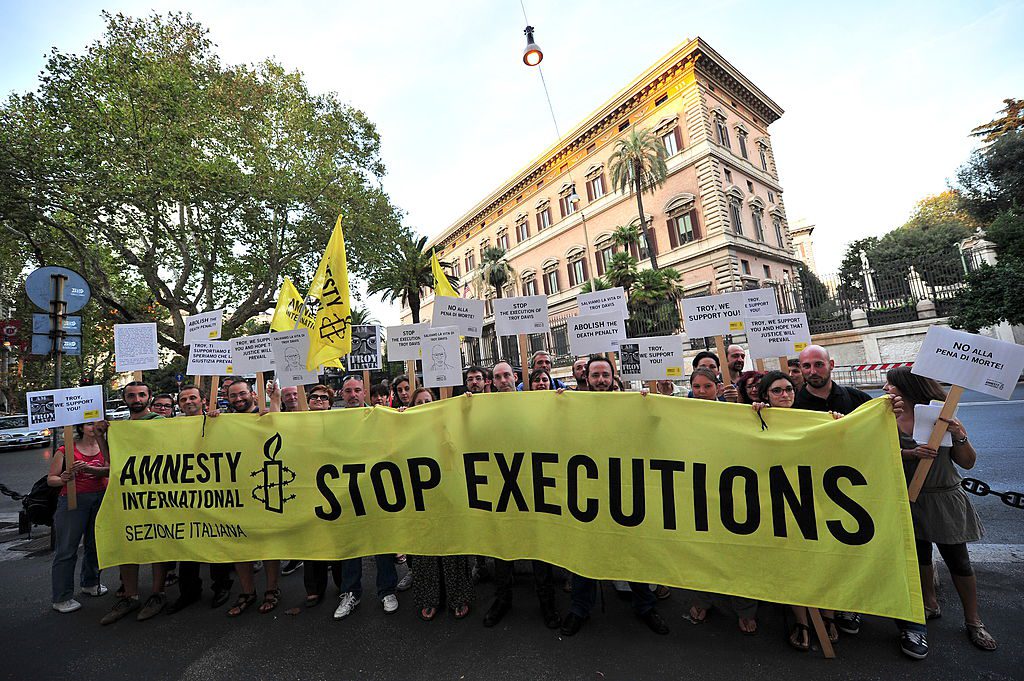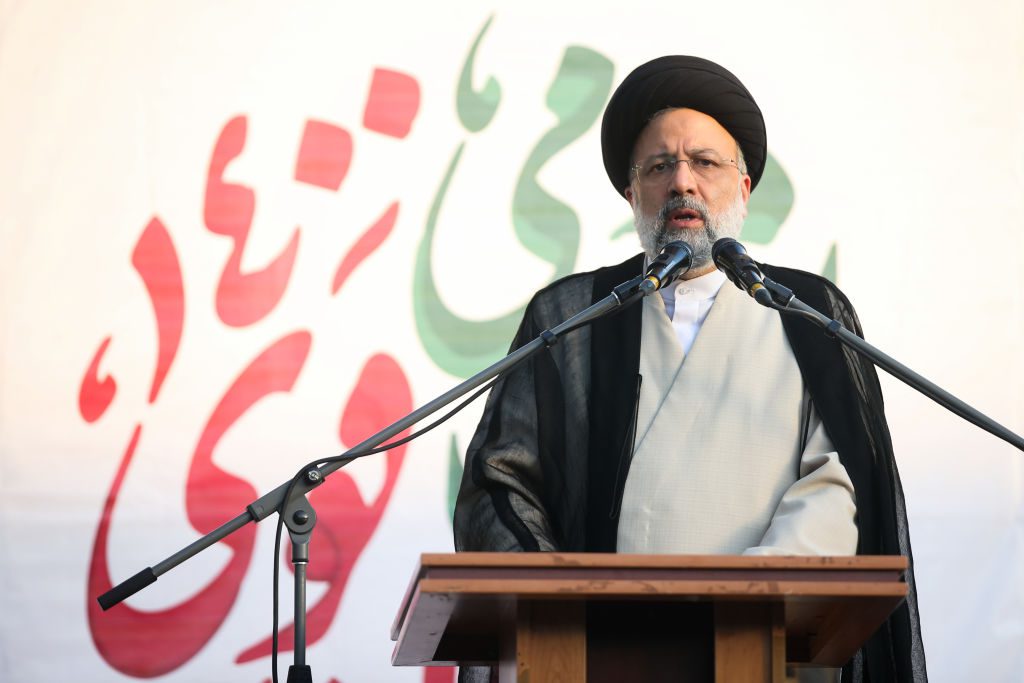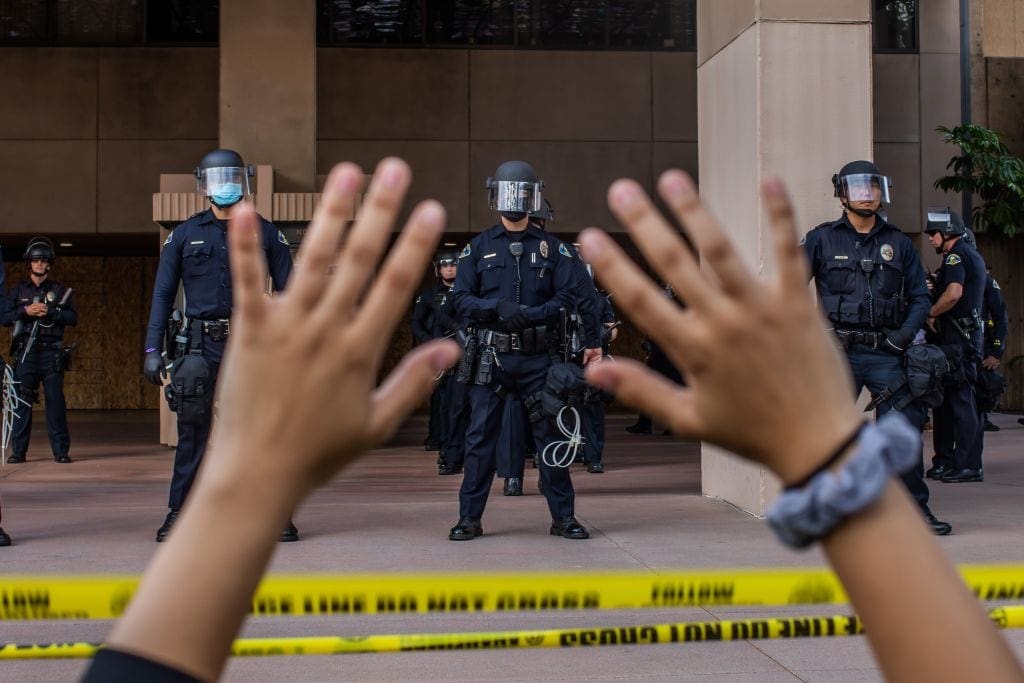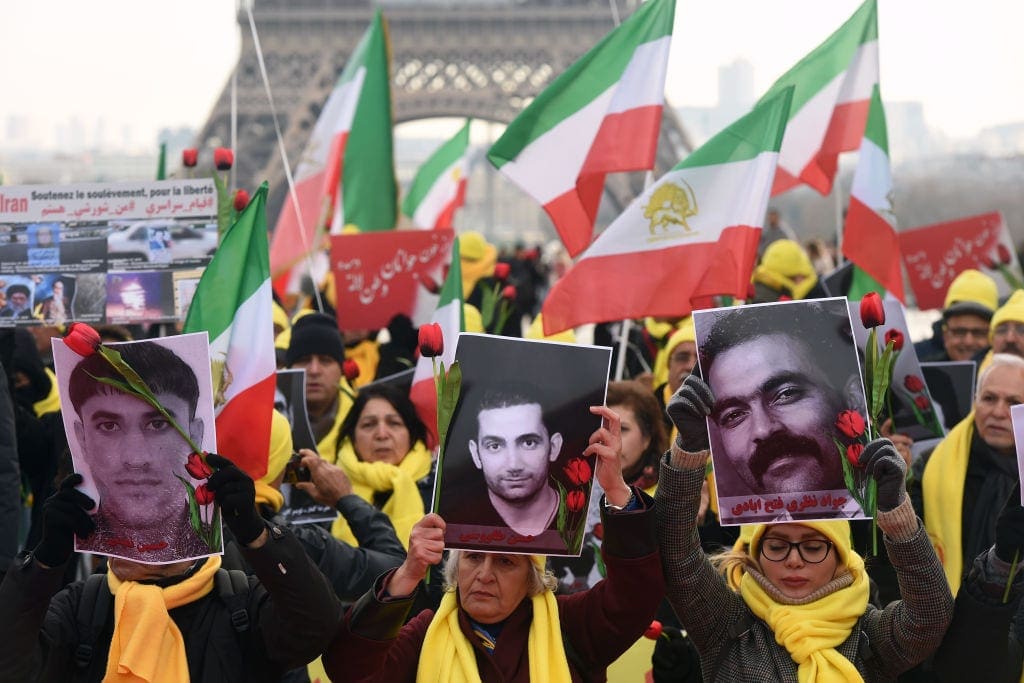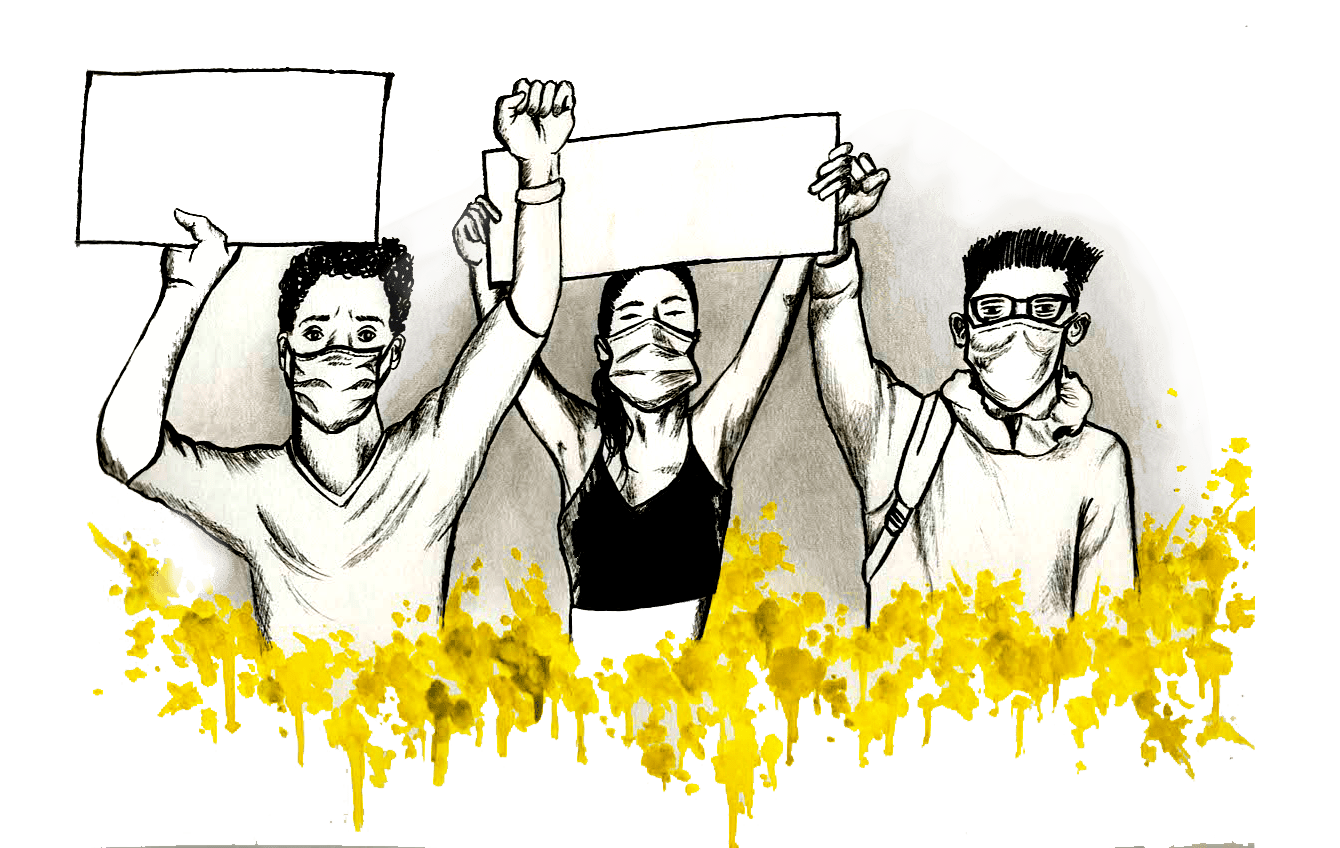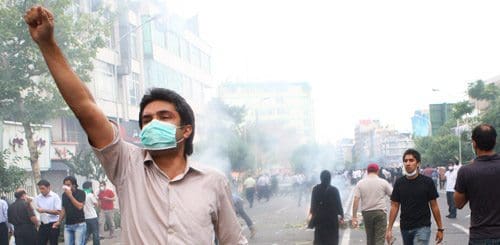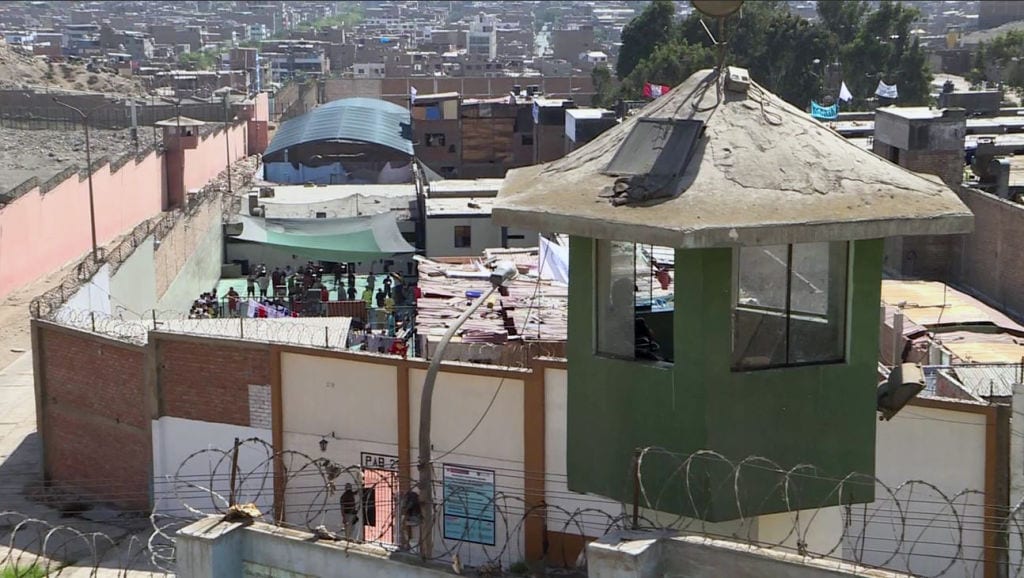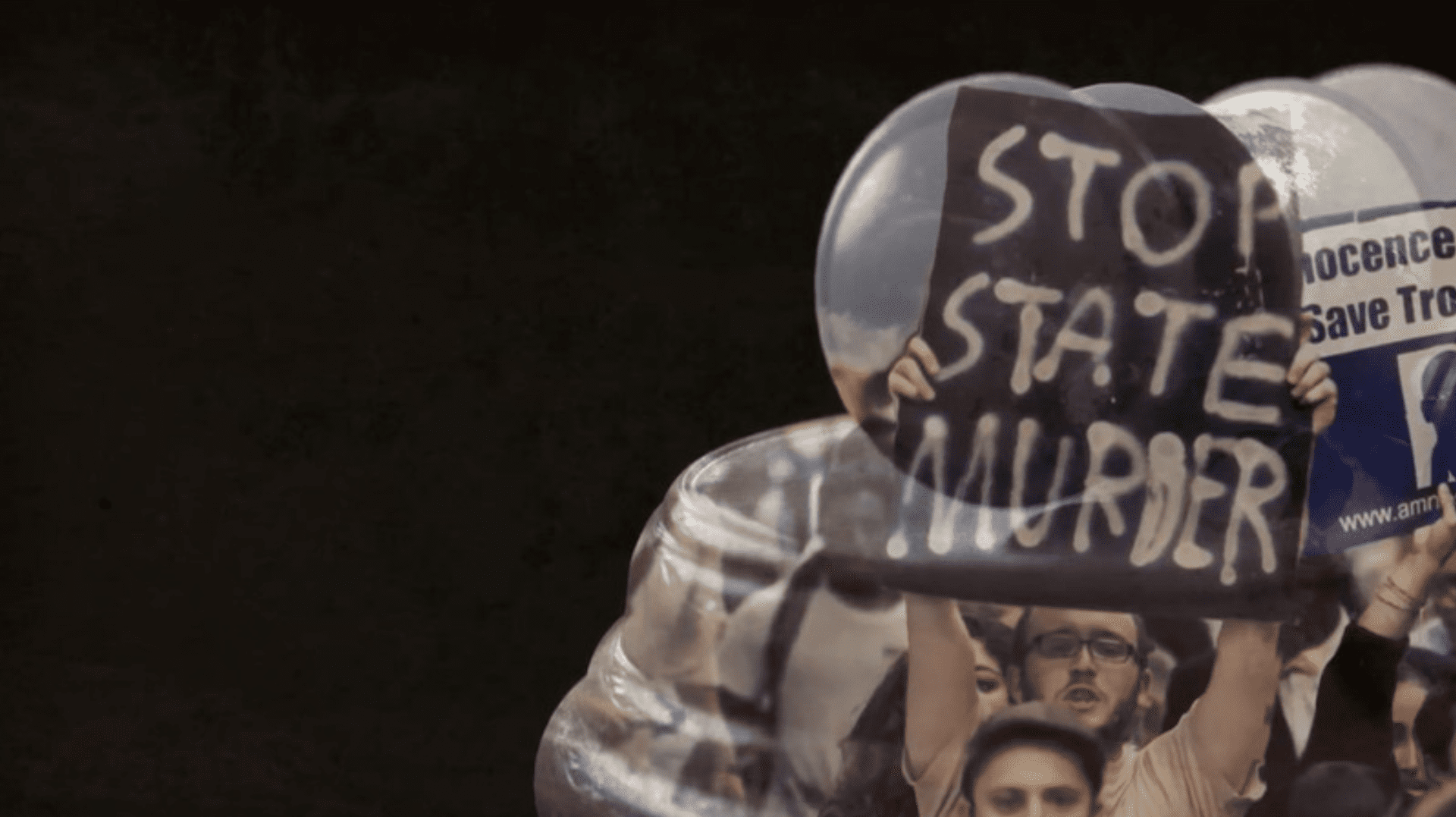Iran Human Rights
Nowruz Action
 The Persian holiday Nowruz (“new day”) is an ancient holiday celebrated on the first day of spring to welcome in the new year. Every Nowruz we remember several courageous prisoners of conscience in Iran with Nowruz greetings. Please send cards with Nowruz greetings to let our imprisoned friends know we are thinking of them at this time. This year we include some individuals who have been persecuted for exercising their right to participate in peaceful protests, an issue of critical importance to Iranians at this time.
The Persian holiday Nowruz (“new day”) is an ancient holiday celebrated on the first day of spring to welcome in the new year. Every Nowruz we remember several courageous prisoners of conscience in Iran with Nowruz greetings. Please send cards with Nowruz greetings to let our imprisoned friends know we are thinking of them at this time. This year we include some individuals who have been persecuted for exercising their right to participate in peaceful protests, an issue of critical importance to Iranians at this time.
wonderful NoWRUZ ACTION update


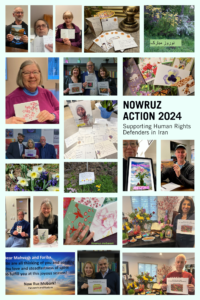
Some of the activists who took the 2024 Nowruz action so far
NEW REPORT DETAILS SHARP INCREASE IN EXECUTIONS IN IRAN SINCE THE OUTBREAK OF THE PROTESTS IN 2022
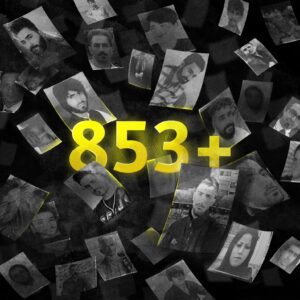

On April 4, 2024 Amnesty International released “Don’t Let Them Kill Us”: Iran’s Relentless Execution Crisis since the 2022 Uprising, detailing the relentless execution spree in Iran, which has transformed prisons across the country into sites of mass killings, with the authorities executing at least 853 people in 2023, amid relentless repression and renewed lethal ‘war on drugs.’ The report reveals how the Iranian authorities have intensified their use of the death penalty to instill fear among the population and tighten their grip on power in the aftermath of the “Woman Life Freedom” uprising of September-December 2022. The briefing also raises alarm over the disproportionate impact of the authorities’ lethal anti-narcotics policies on poor and marginalized communities. The number of executions in 2023 is the highest recorded since 2015 and marks a 48% increase from 2022 and a 172% increase from 2021. Please also take this urgent action calling for the authorities to immediately halt all drug-related executions, quash convictions and death sentences issued following grossly unfair trials before Revolutionary Courts, and establish an official moratorium on executions with a view to fully abolishing the death penalty.
SUPPORT COURAGEOUS RAPPER AND HIP HOP ARTIST TOOMAJ SALEHI WHO HAS BEEN IMPRISONED FOR SUPPORTING PROTESTERS IN IRAN
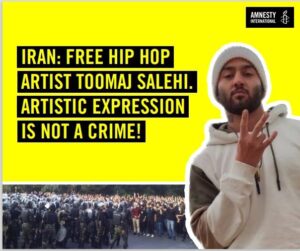

Toomaj Salehi is a popular rapper and Hip-Hop artist who has been outspoken in his support of protesters in Iran and in his criticism of the Iranian government for its human rights violations. He was held in detention since his arrest in October 2022 and was subjected to severe beatings and prolonged solitary confinement. He was sentenced to more than six years in prison and an artistic ban. Toomaj is a spotlight for AIUSA in September and October 2023 and also featured in the annual Banned Books Week action. We were overjoyed when he was released on bail in November 2023 but two weeks later, after he publicly revealed the torture he endured in custody, he was re-arrested and accused of spreading lies and false propaganda against the system. Please take action now to call for his immediate and unconditional release. You can watch Toomaj’s inspiring videos here
In one video called “Fal” (fortune-telling) he sings “Someone has lost their young children and someone has lost their youth. Someone’s crime was having hair that flows free in the wind….someone’s crime was having a brave heart and a sharp tongue.”
Celebrities of the Iranian Diaspora—comedian Maz Jobrani and actors Nazanin Boniadi and Arian Moayed–contributed to this video in support of Toomaj Salehi
AMNESTY INTERNATIONAL PRODUCES TROUBLING NEW REPORT ON SEXUAL ASSAULTS OF PROTESTERS ARRESTED DURING FALL 2022 PROTESTS
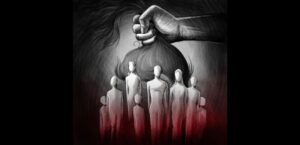

On December 6, 2023 Amnesty published its report entitled “They Violently Raped Me”: Sexual Violence Weaponized to Crush Iran’s “Woman, Life, Freedom” Uprising. This report details the violations of men, women and children in custody. Amnesty International gathered testimonies from 45 individuals on the commission of rape and other forms of sexual violence against protesters arrested across Iran between September and December 2022 in connection with the uprising and obtained and reviewed relevant documents, wherever available, including medical records, photographic evidence of injuries, and written complaints made by survivors and/or their families.
AIUSA ACTIVISTS SHOW SUPPORT FOR TOOMAJ SALEHI AND ALL IRANIANS PUNISHED FOR INVOLVEMENT IN PROTESTS AT THE UN PLAZA IN NEW YORK SEPTEMBER 19, 2023
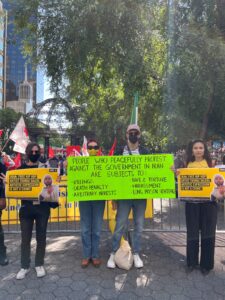

At THE ONE YEAR ANNIVERSARY OF THE PROTESTS IN IRAN THE international community must combat impunity for brutal crackdowN
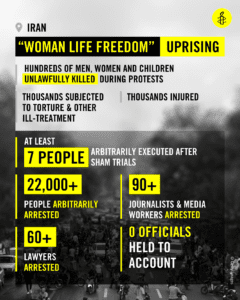

Amnesty International issued a press release on September 13, 2023, the one year anniversary of the arrest of 22-year-old Mahsa Amini, for allegedly not wearing her Hijab properly. She died in custody three days later. “The anniversary of the ‘Woman Life Freedom’ protests offers a stark reminder for countries around the world of the need to initiate criminal investigations into the heinous crimes committed by the Iranian authorities under universal jurisdiction. Government statements calling on the Iranian authorities to halt the unlawful use of firearms against protesters, stop torturing detainees, and release all individuals detained for peacefully exercising their human rights remain as crucial as ever. These actions show victims they are not alone in their darkest hour.”
IRANIAN AUTHORITIES MUST HALT EXECUTIONS IN CONNECTION WITH RECENT WAVES OF PROTESTS
So far, nine young men have been executed in connection with the fall 2022 protests in Iran. The most recent execution, of Mohammad Ghobadlou, took place on January 23, 2024. The previous execution, of Milad Zohrevand, took place on November 23, 2023. On May 19, 2023, Iranian authorities executed three men, Majid Kazemi, Saleh Mirhashemi and Saeed Yaghoubi, in connection with their involvement in mostly peaceful protests that broke out in September 2022. They had been convicted of “enmity against God” (Moharebeh) in proceedings that failed to adhere to international standards for fair trials. The “evidence” against them consisted of confessions that had been extracted under severe torture and duress. Several other people are at imminent risk of execution for their involvement in the protests. Please take this action to call on the authorities to immediately quash all convictions and death sentences stemming from the protests, refrain from seeking further death sentences, and ensure that anyone charged with a recognizable criminal offense is tried in proceedings meeting international fair trial standards without recourse to the death penalty.
Nowruz Action



Many Amnesty activists took the 2023 Nowruz action. Here is a collage of photos of the different actions:
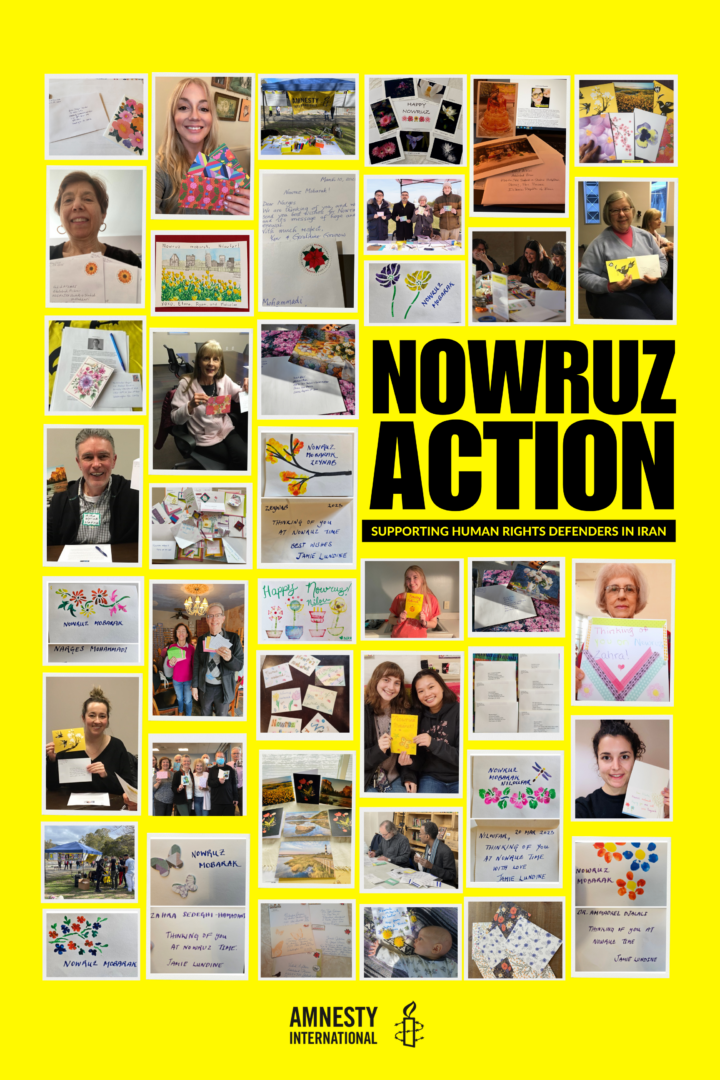

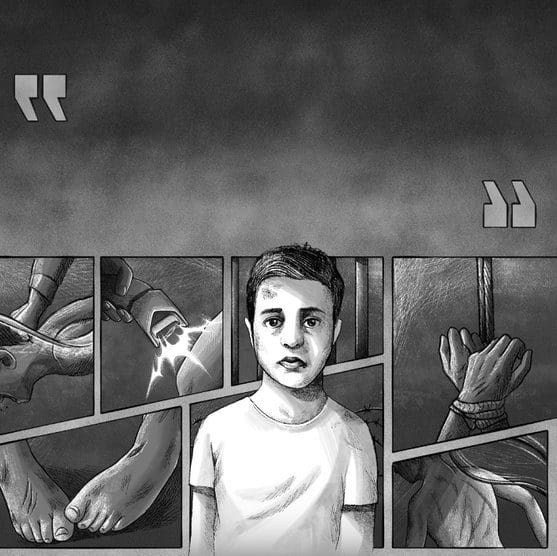
ChiLDREN ARRESTED DURING PROTESTS IN IRAN SUBJECTED TO TORTURE, SEXUAL ASSAULT AND OTHER Abuse
Amnesty International has found that children arrested during the mostly peaceful protests that have taken place in Iran over the last several have been subjected to horrific violence in custody in order to punish and humiliate them. Young people have been at the forefront of the protests in the wake of the death in custody of Mahsa Amini in September 2022.
Amnesty International Joins the “I Oppose Mandatory Hijab” Campaign
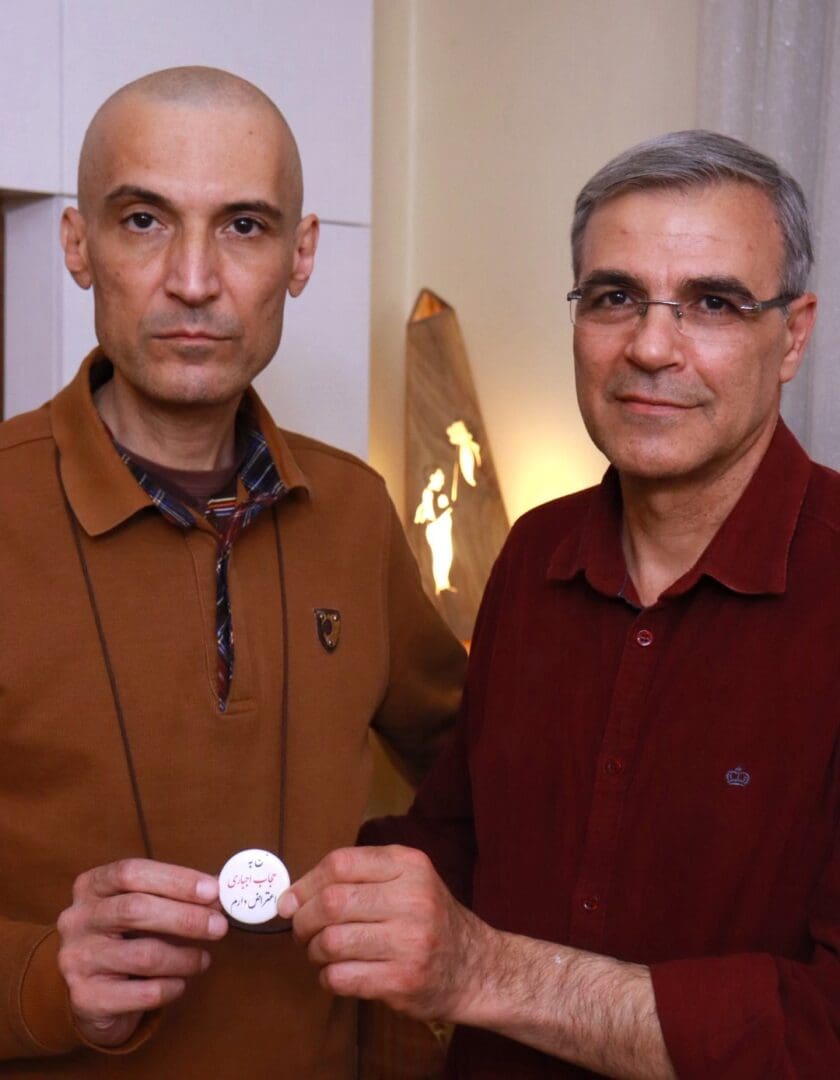

Amnesty International is pleased to join several organizations to support the I Oppose Mandatory Hijab campaign. People all over Iran have demanded an end to forced veiling as part of the overall Woman, Life, Freedom protests. Film-maker Jeff Kaufman has initiated a new campaign together with Iranian human rights defenders Nasrin Sotoudeh, Reza Khandan and Farhad Meysami, all of whom have been persecuted for their expressed opinion that people should be able to choose what to wear. One reason that Reza Khandan and Farhad Meysami (who was recently released from prison after undergoing a hunger strike) had been targeted was their creation and possession of thousands of buttons that said “I OPPOSE THE COMPULSORY HIJAB.” Almost all these buttons were seized and destroyed a few years ago. The new campaign ordered hundreds of exact copies of Reza and Farhad’s button. They are reaching out to people around the world to show solidarity by wearing an “I OPPOSE THE COMPULSORY HIJAB” button, taking a photo, and posting it on social media. Amnesty International adamantly supports the right of people to wear Hijab as their choice, and also the right to peacefully oppose the imposition of mandatory Hijab.
U.N. Human Rights council establishes mechanism to investigate Iran’s Brutal response to ongoing protests
Amnesty International was gratified that the United Nations Human Rights Council (UNHRC) voted on November 24, 2022 to establish a a fact-finding mission to investigate human rights violations in Iran related to the protests that began in September 2022, following the death in custody of Mahsa Zhina Amini, for allegedly wearing “bad Hijab.” Amnesty International had collected more than 760,000 petition signatures from activists around the world calling on the UNHRC to set up an independent mechanism to hold the Iranian authorities accountable for the horrific indiscriminate violence unleashed against protesters in the last several weeks. Amnesty issued a joint statement with 42 other organizations urging the UN Human Rights Council to hold a special session on Iran to set up that mechanism. In March 2024 the fact-finding mission issued comprehensive reports detailing a range of serious human rights violations that were perpetrated by Iranian authorities in the context of the protests. Amnesty International and other human rights organizations issued a joint letter to call on member states of United Nations Human Right Council to support the renewal of the mandate of the UN Special Rapporteur on the situation of human rights in the Islamic Republic of Iran and the extension of the mandate of the Independent International Fact-Finding Mission
Protest Rampant Human Rights Abuses against Iranians protesting against the violent death in custody of young woman arrested for “bad hijab”
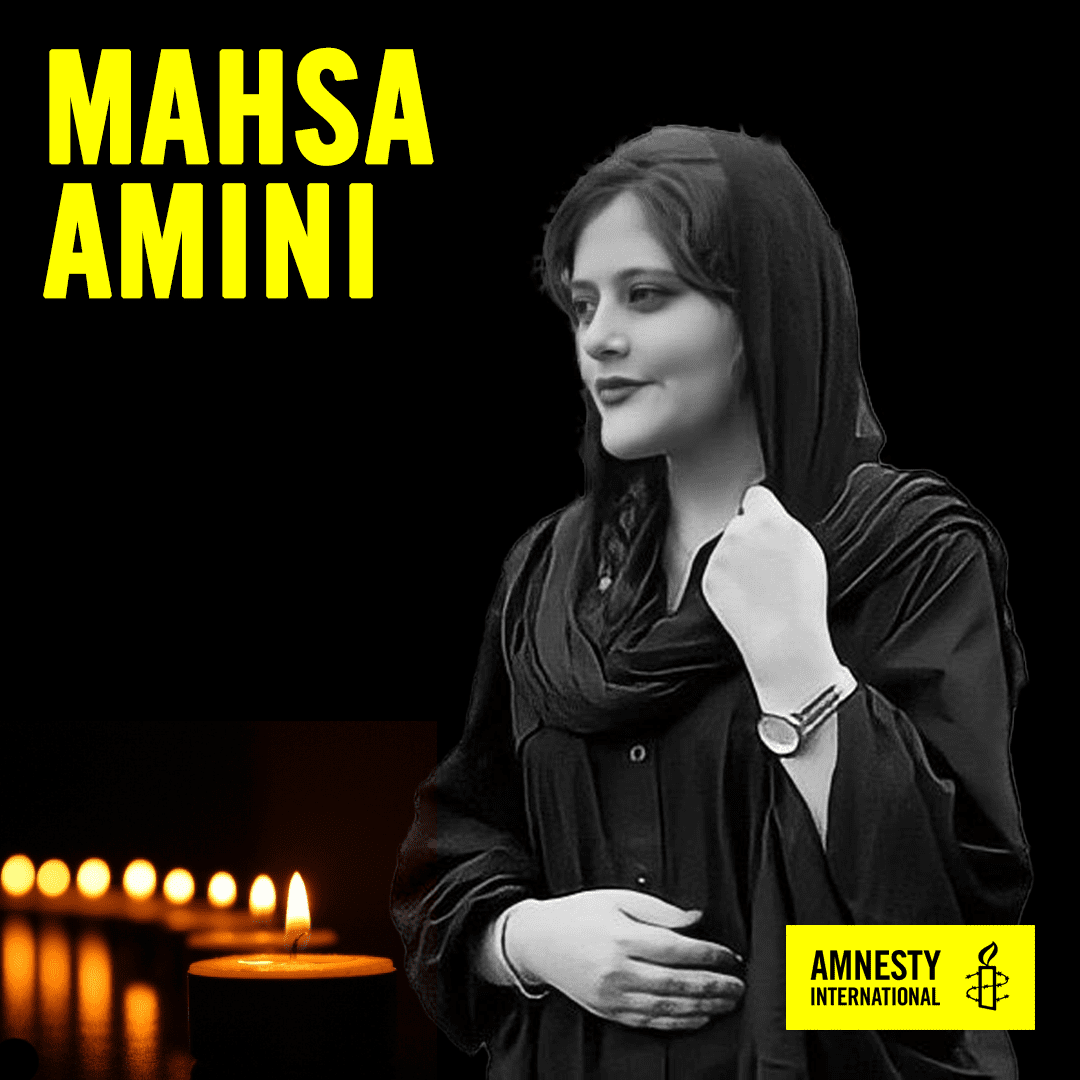

On 16 September 2022, 22-year-old Mahsa Amini died days after her violent arrest for not wearing a head scarf properly. She had been visiting Tehran with her family when she was confronted by the “morality police” who forced her into a van and took her to a detention center where she collapsed and slipped into a coma. Protests have taken place all over the country as thousands have taken to the streets to express their outrage at this senseless death. Instead of agreeing to a transparent investigation into her death, the authorities have unleashed a brutal crack down on protesters, resulting in hundreds of deaths and serious injuries. The authorities are holding sham trials that could result in the death penalty for at least 28 people involved in or expressing support for the public protests, including three juveniles. At least six people have already been sentenced to death after grossly unfair trials in Revolutionary Courts. Activists are urged to take this action to call for the death sentences to be quashed and that those exercising their rights to peaceful expression and assembly be released and not prosecuted, and that any proceedings held for those accused of recognizable criminal offenses be conducted according to international standards for fair trials. Three young men who were brutally tortured in custody face execution in connection with alleged crimes committed during the protests. Take this action now to save their lives.
At least 305 people have been killed by government agents during protests, including at least 41 children; among them several children who were brutally beaten to death and whose families have been threatened to ensure their silence. Many of those killed were members of Iran’s ethnic minority communities, including Kurds and Baluchis.
UPDATE: outrageous Death Sentence against LGBTQ ACTIVIST Zahra Sedighi-Hamadani
On 4 September 2022 Iran’s judiciary announced that LGBTI rights defender Zahra Sedighi-Hamadani (known as Sareh) and another woman Elham Choubdar were sentenced to death for “corruption on earth” in connection to their alleged involvement in “smuggling women and girls for the purpose of corruption and directing and supporting homosexual groups.” Information obtained by Amnesty International indicates that the convictions and sentences are based on discriminatory reasons related to the women’s real or perceived sexual orientation and/or gender identity and, in the case of Zahra Sedighi-Hamadani, her peaceful LGBTI rights activism. Amnesty called on Iran’s authorities to immediately quash the convictions and death sentences and release Zahra Sedighi-Hamadani and Elham Choubdar. Zahra Sedighi-Hamadani was one of the subjects of AIUSA’s 2022 Banned Book Week action. In December 2022, the Supreme Court overturned her conviction and death sentence and sent her case (and that of Elham Choubdar) to a lower court for retrial. On March 18, 2023, Zahra Sedighi-Hamadani was released from prison on bail. Thank you to everyone who took action on her case.
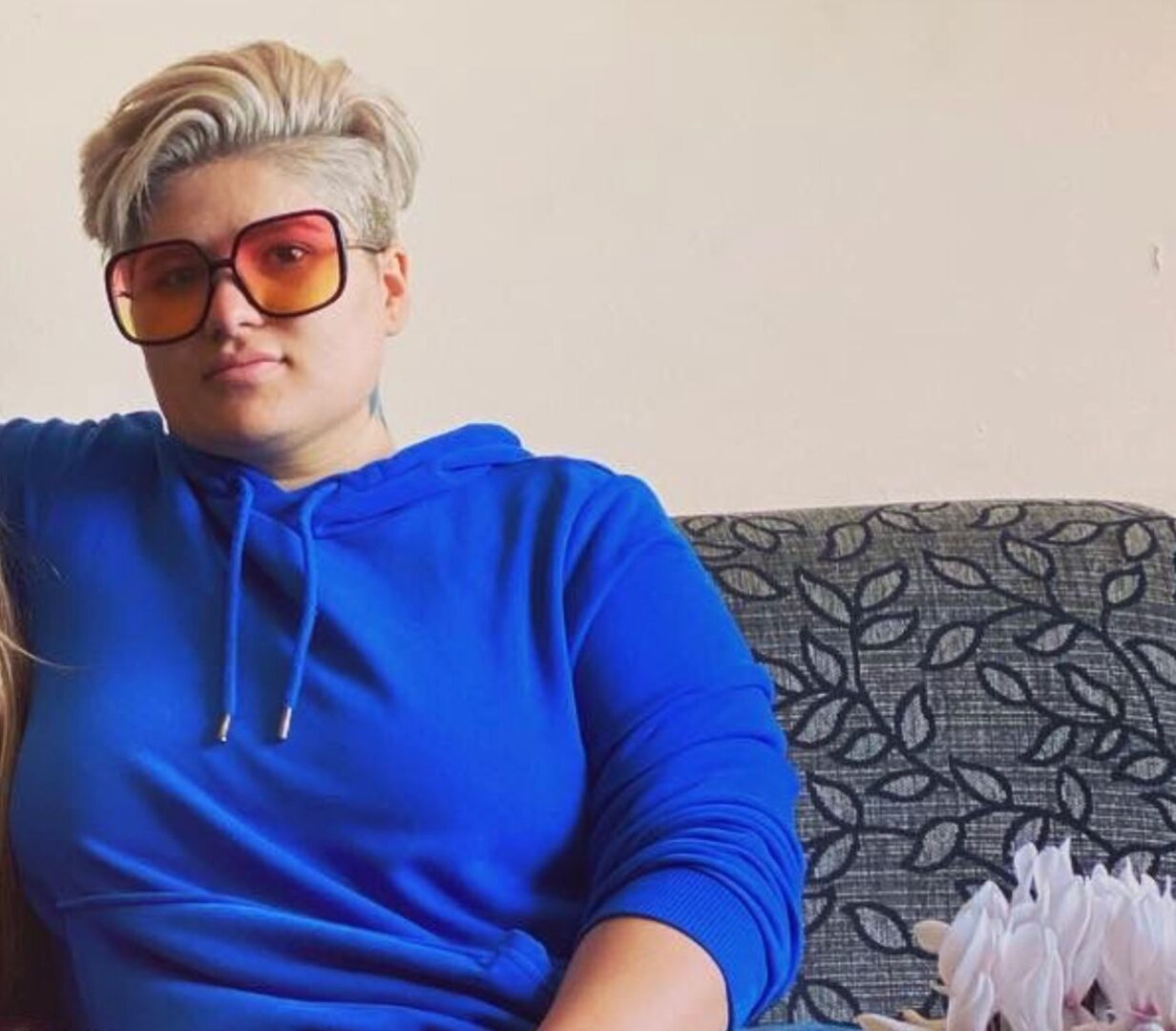

TAKE ACTION TO PREVENT THE IMMINENT EXECUTION OF SWEDISH-IRANIAN EMERGENCY MEDICINe eXPErt
An egregious example of the deployment of the death penalty for political purposes is the case of Dr. Ahmadreza Djalali, a Swedish-Iranian specialist in emergency medicine. He barely escaped an execution scheduled to take place on December 1 after an international outcry, including a letter signed by 153 Nobel science prizes laureates. and was given a reprieve of unknown duration. Now it has been reported that his execution may be carried out by May 21, 2022. Please take action immediately to call for a halt to this execution. Amnesty issued a statement detailing its findings that Dr. Djalali is being held as a hostage—a clear violation of international law–and that the threat of his imminent execution is being used as a form of extortion.
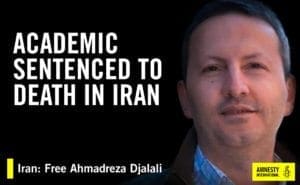


Dr. Djalali was sentenced to death for “corruption on earth” (efsad-e fel-arz) in October 2017 after a grossly unfair trial before Branch 15 of the Revolutionary Court in Tehran. The court relied primarily on “confessions” that Ahmadreza Djalali says were obtained under torture and other ill-treatment while he was held in prolonged solitary confinement without access to a lawyer. He had been arrested in April 2016 while on a trip to Iran at the invitation of Tehran University to speak about disaster medicine. He was accused of providing information to Israel that was allegedly used in the assassination of several Iranian scientists. Iranian State television aired the “confession” in December 2017. Dr. Djalali could be executed at any time Activists are urged to write to write to the head of the judiciary in Iran via Iran’s Permanent Mission to the UN in Geneva at the following email addresses: [email protected] and [email protected] .
Iranian Authorities RESPonsible for dozens of deaths in Custody in the last 12 years
In a report released on 12 April 2022 Amnesty International has documented the cases of 96 people who died in custody in Iran since 2010. Iranian officials have refused to investigate and hold those responsible accountable. Amnesty has reported how prison authorities routinely cause or contribute to deaths in custody, including by blocking or delaying prisoners’ access to emergency hospitalization and other necessary medical care. At least 11 prisoners died after being denied adequate healthcare for traumatic injuries that occurred at the time of arrest or during imprisonment. The other 85 prisoners died after being denied adequate medical care for serious medical emergencies involving, among things, heart attacks and strokes, gastrointestinal complications, respiratory complications, kidney problems, Covid-19 or other infectious diseases, which either emerged suddenly or were related to pre-existing illnesses for which they had not received adequate specialized healthcare throughout their imprisonment.
EXECUTION OF JUVENILE OFFENDER
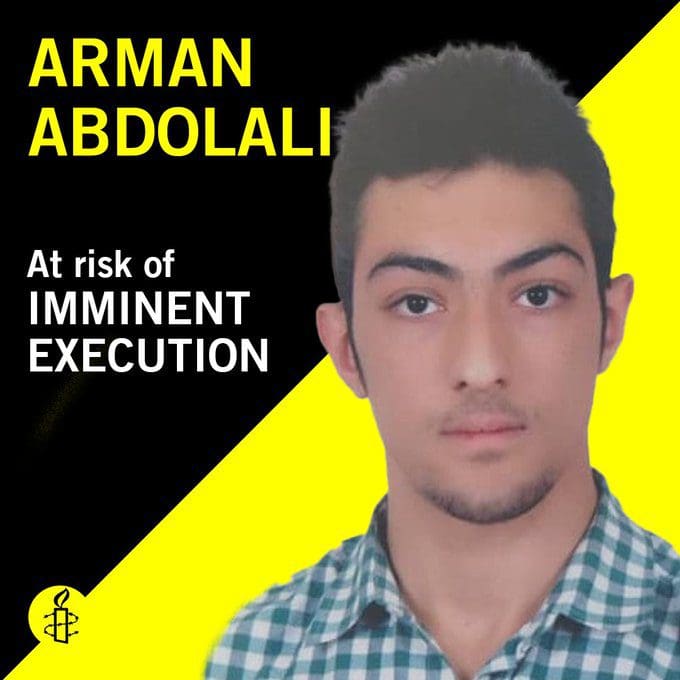


SECURITY FORCES USE DEADLY FORCE TO SUPPRESS PROTESTS
In August 2022 Amnesty International issued a briefing about the use of excessive and indiscriminate force against mostly peaceful protests that took place in Southwestern Iran in May 2022. The use of live ammunition and birdshot resulted in a number of deaths and injuries among protesters and bystanders. This use of violence reflects increasing militarization of the policing of protests in recent years, which has left hundreds of protesters and bystanders, including children, dead and thousands of others injured since December 2017. On November 11, 2021 Amnesty International issued a press release noting that an international “people’s tribunal” on the Iranian authorities’ killing and wounding of thousands of protesters and bystanders during nationwide protests in November 2019 is a powerful initiative against impunity and must serve as a wake-up call to all UN member states. AI Iran researcher Raha Bahreini presented expert testimony at the tribunal, which also included evidence heard from dozens of witnesses, such as protesters, victims’ relatives, torture survivors, healthcare workers and former security officials. Several expert witnesses will also testify before the tribunal, which will be presided over by prominent lawyers and judges. On the same day Amnesty released a report detailing the deaths of 323 people who were killed by Iran’s security forces during the crackdown on the protests.
On July 23, 2021 Amnesty International issued a press release condemning the use of deadly force against mostly peaceful protests in the southwestern province of Khuzestan. Video footage together with consistent accounts from the ground, indicate security forces used deadly automatic weapons, shotguns with inherently indiscriminate ammunition, and tear gas to disperse protesters, resulting in the deaths of at least eight people and scores of injuries. Many others have been arrested. Protesters took to the streets in Khuzestan—one of Iran’s poorest regions, inhabited largely by Arabic speaking Ahwazis—because of severe water shortages and power outages due to drought and climate change; many were chanting “we are thirsty.” The Iranian authorities have long responded to peaceful protests with violence, including the use of live ammunition and the arrests, torture and mistreatment of those exercising their right to peaceful assembly and expression. Amnesty International is calling on the Iranian authorities to immediately cease the use of indiscriminate violence, to release all those detained solely for peacefully exercising their right to freedom of expression and assembly, and to protect all detainees from torture and other ill-treatment.
Amnesty International has been documenting and campaigning around serious human rights violations in Iran including detention of human rights defenders and other prisoners of conscience, unfair trials, torture and mistreatment in detention, deaths in custody and the application of the death penalty. Iran executes more people than any country in the world, other than China. Ethnic, religious and linguistic minority communities face persistent persecution. The Iranian authorities also suppress freedom of expression of a range of civil society actors including attorneys, scientists, environmental activists, artists, women’s rights activists, trade unionists, journalists and bloggers and those expressing their opinions on social media. There has been a worrying trend of imposing extreme sentences against prisoners of conscience such as human rights attorneys Nasrin Sotoudeh who has been sentenced to a total of 38 years in prison plus 148 lashes and Amirsalar Davoudi, who has been sentenced to 30 years in prison and 111 lashes for his human rights work, including publicizing violations through a channel he set up on the Telegram mobile messaging app and giving media interviews.
Hundreds of others are in detention; many of those serving prison terms have been convicted in unfair trials before Revolutionary Courts on vague charges including “propaganda against the state” or “endangering the security of the state.” Iranian authorities have used these vague charges to suppress the right of its citizens to peaceful expression and association. The Iranian government has also endeavored to prevent Iranians from accessing information by blocking internet sites and even harassing the family members of journalists for BBC Persian and VOA Persian, which continue to broadcast news into Iran.
Executions in Iran
Iran has long held the dubious distinction of being the Number Two executioner in the world (after China). Iran is also among the tiny handful of countries that continue to execute juvenile offenders—those whose alleged crime occurred when they were younger than eighteen. Further compounding the abuses are systemic problems in the Iranian justice system, where suspects are routinely tortured or mistreated to coerce confessions. According to a troubling report issued in May 2023, Iran executed at least 576 people in 2022, a sharp increase over the 314 executions Amnesty International was able to verify for 2021.
A number of troubling executions—both those carried out and those scheduled to take place—illustrate the increasingly outrageous application of the death penalty—not only for those unfairly convicted of criminal offenses, but also for those accused of vague national security offenses. Members of Iran’s ethnic minority communities are disproportionately likely to be condemned to be executed for politically motivated offenses, usually after having been subjected to torture, forced confessions and grossly unfair trails. Please take action on behalf of Iranian-Kurdish dissidents whose death sentences were confirmed on January 2, 2024 and who are at imminent risk of execution. One of them, Farhad Salimi, was tragically executed on January 23, 2024.
One of the most controversial and widely condemned executions in many years was the hanging of journalist Rouhollah Zam on December 14, 2020. He had fled Iran in the aftermath of the 2009 post-election protests and had been living in France where he was granted asylum. He was allegedly lured to Iraq in October 2019 where he was abducted under mysterious circumstances and brought to Iran where he stood trial in a Revolutionary Court on charges of “spreading corruption on earth” in connection with his popular news channel, AmadNews, that he ran on the messaging app Telegram. The channel, which had more than a million followers, shared videos of protests and information about the alleged involvement of various authority figures in corruption. The authorities claimed that his media work involved “espionage” for Israel and France, “cooperation with the hostile state of the United States”, “crimes against national security” and “spreading propaganda against the system.”
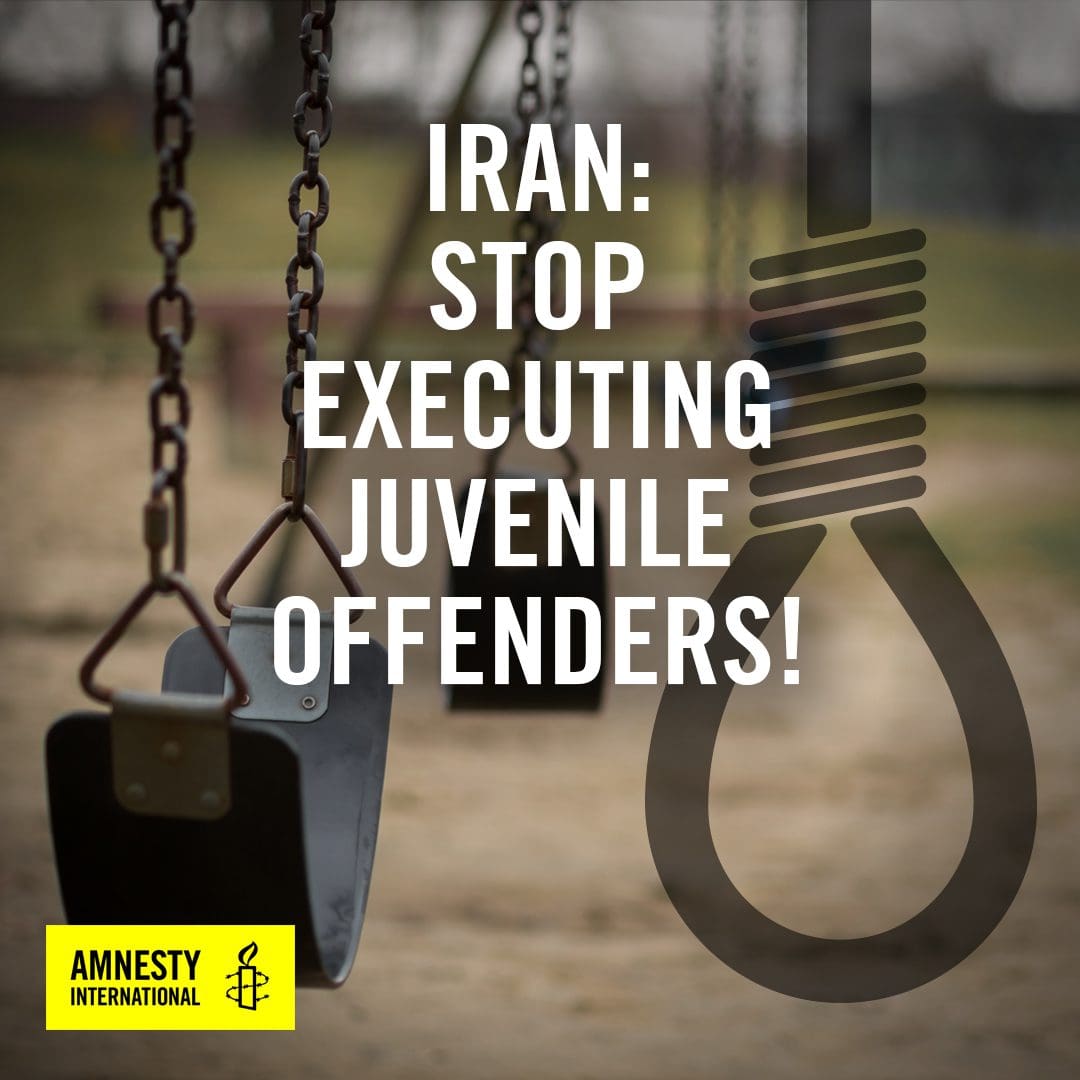

ARMIN ABDOLALI EXECUTED ON NOVEMBER 24, 2021



An egregious example of the deployment of the death penalty for political purposes is the case of Dr. Ahmadreza Djalali, a Swedish-Iranian specialist in emergency medicine. He barely escaped an execution scheduled to take place on December 1 after an international outcry, including a letter signed by 153 Nobel science prizes laureates. and was given a reprieve of unknown duration.



Dr. Djalali was sentenced to death for “corruption on earth” (efsad-e fel-arz) in October 2017 after a grossly unfair trial before Branch 15 of the Revolutionary Court in Tehran. The court relied primarily on “confessions” that Ahmadreza Djalali says were obtained under torture and other ill-treatment while he was held in prolonged solitary confinement without access to a lawyer. He had been arrested in April 2016 while on a trip to Iran at the invitation of Tehran University to speak about disaster medicine. He was accused of providing information to Israel that was allegedly used in the assassination of several Iranian scientists. Iranian State television aired the “confession” in December 2017. Dr. Djalali could be executed at any time Activists are urged to write to write to the head of the judiciary in Iran via Iran’s Permanent Mission to the UN in Geneva at the following email addresses: [email protected] and [email protected] .
The Iranian authorities are sensitive to international public opinion so it is essential that activists speak out against executions carried out in Iran. Please take action right away and please share the information with all your contacts so we can save Dr. Djalali who is at high risk of imminent execution.
Severe Persecution of Iran’s Ethnic Minorities
The Iranian authorities have a long history of persecuting its ethnic minorities: especially Kurds who live in Northwest Iran, Arabs (also known as Ahwazis) who live in the Southwest, and Baluchis who live in the Southeast. Iranian Kurds and Baluchis are also mostly minority Sunni Muslims (Arab Iranians are either Shi’a or Sunni). Kurds, Arabs and Baluchis live in the most economically disadvantaged regions of Iran, and face persecution for advocating for more rights for their communities. They are also far more likely to be subjected to severe torture and ill-treatment in detention, to be sentenced to death for politically motivated offenses, and to be executed.
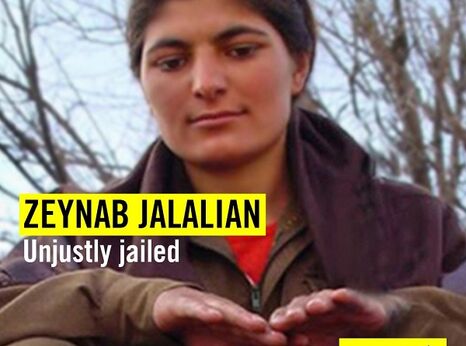

Kurdish-Iranian prisoner Zeynab Jalalian
Since 6 January 2021, at least 96 individuals from Iran’s Kurdish minority, including civil society activists, labor rights activists, environmentalists, writers, university students and political activists have been arrested by the intelligence unit of Iran’s Revolutionary Guards or Ministry of Intelligence agents. According to Kurdish human rights groups, in 2020, over 500 Iranian Kurds including human rights defenders, were arrested for politically motivated reasons and charged with broad and vaguely worded national security-related offenses. At least 159 of them were subsequently sentenced to prison terms ranging from one month to 17 years and four received the death penalty. According to UN Special Rapporteur on Iran, “Kurdish political prisoners charged with national security offences … constitute a disproportionately high number of those who received the death penalty and are executed.”
There has been an alarming rise in executions of minority prisoners; since 19 December 2020, the Iranian authorities have executed at least 53 people, about a third of them Baluchis. “The recent escalation in executions of Baluchis and Ahwazi Arabs raises serious concerns that the authorities are using the death penalty to sow fear among disadvantaged ethnic minorities, as well as the wider population. The disproportionate use of the death penalty against Iran’s ethnic minorities epitomizes the entrenched discrimination and repression they have faced for decades,” said Diana Eltahawy, Deputy Director for the Middle East and North Africa at Amnesty International.
Please go here to take action to protest the secret executions of four Ahwazi prisoners on 28 February 2021, and to call for the release of three other Ahwazi prisoners who are being denied proper medical care. The four men who were executed had been severely tortured in prison. They were forced to make confessions of their guilt; a tactic that has been repeatedly used by Iranian authorities to obtain convictions. The authorities have also refused to release their bodies to their families for burial and mourning rituals. Heidar Ghorbani, who is a Kurdish-Iranian, is at imminent risk of execution for “armed rebellion against the state” (baghi), despite serious fair trial violations and the trial court confirming that he was never armed. In August 2021, the Supreme Court rejected his second request for judicial review. His conviction is based on torture tainted “confessions” obtained while he was forcibly disappeared. Please go here to take action calling for his execution to be stayed. Please go here to take action on two Baluchi men who are at imminent risk of execution.
Please go here for more information and to this press release signed by Amnesty International and 36 other organizations about the ongoing wave of arbitrary arrests, incommunicado detention, and enforced disappearances by the Iranian authorities, targeting scores of people from Iran’s disadvantaged Kurdish minority. Please go here to take action on behalf of So’ada Khadirzadeh, an Iranian-Kurdish woman who was arrested and arbitrarily detained while pregnant; after giving birth via Caesarean Section, she was returned to prison with her newborn infant where she they are not receiving proper care.
Amnesty international actions
NASRIN SOTOUDEH
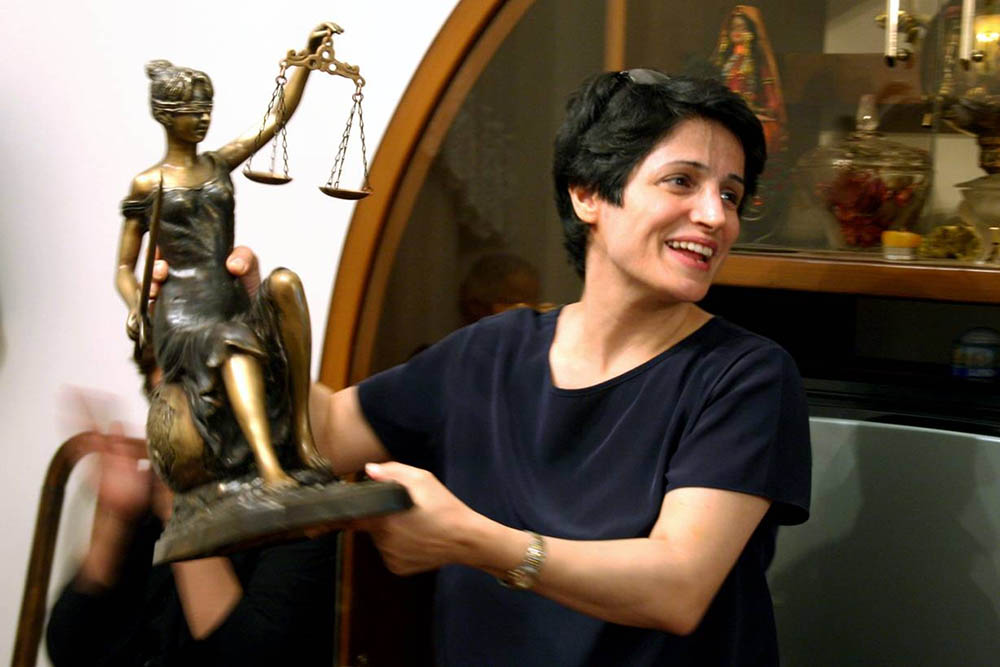

Nasrin Sotoudeh is a world-renowned Iranian human rights attorney who has won numerous prizes and accolades, including the 2012 Sakharov Prize for Freedom of Thought awarded by the European Parliament. However instead of honoring such an eminent citizen, the Iranian authorities sentenced her to an astonishing 38 years in prison plus 148 lashes solely for her peaceful advocacy and representation of her clients—one of the harshest sentences ever handed down to a prisoner of conscience in Iran. If she has to serve this entire sentence, she will be in her nineties by the time she is released.
Nasrin Sotoudeh who represented women targeted by Iranian authorities for protesting forced hijab (veiling), has been sentenced on several spurious national security-related charges including “forming a group with the purpose of disrupting national security”, “spreading propaganda against the system” and “gathering and colluding to commit crimes against national security.” She had first found out that she had been sentenced to five years in prison for “assisting in hiding spies with the intent to harm national security” imposed in absentia when she was arrested in June 2018. In March 2019 it was revealed that she had been sentenced to an additional 33 years plus the lashes.
Prisoner of Conscience in Need of Urgent Medical Care
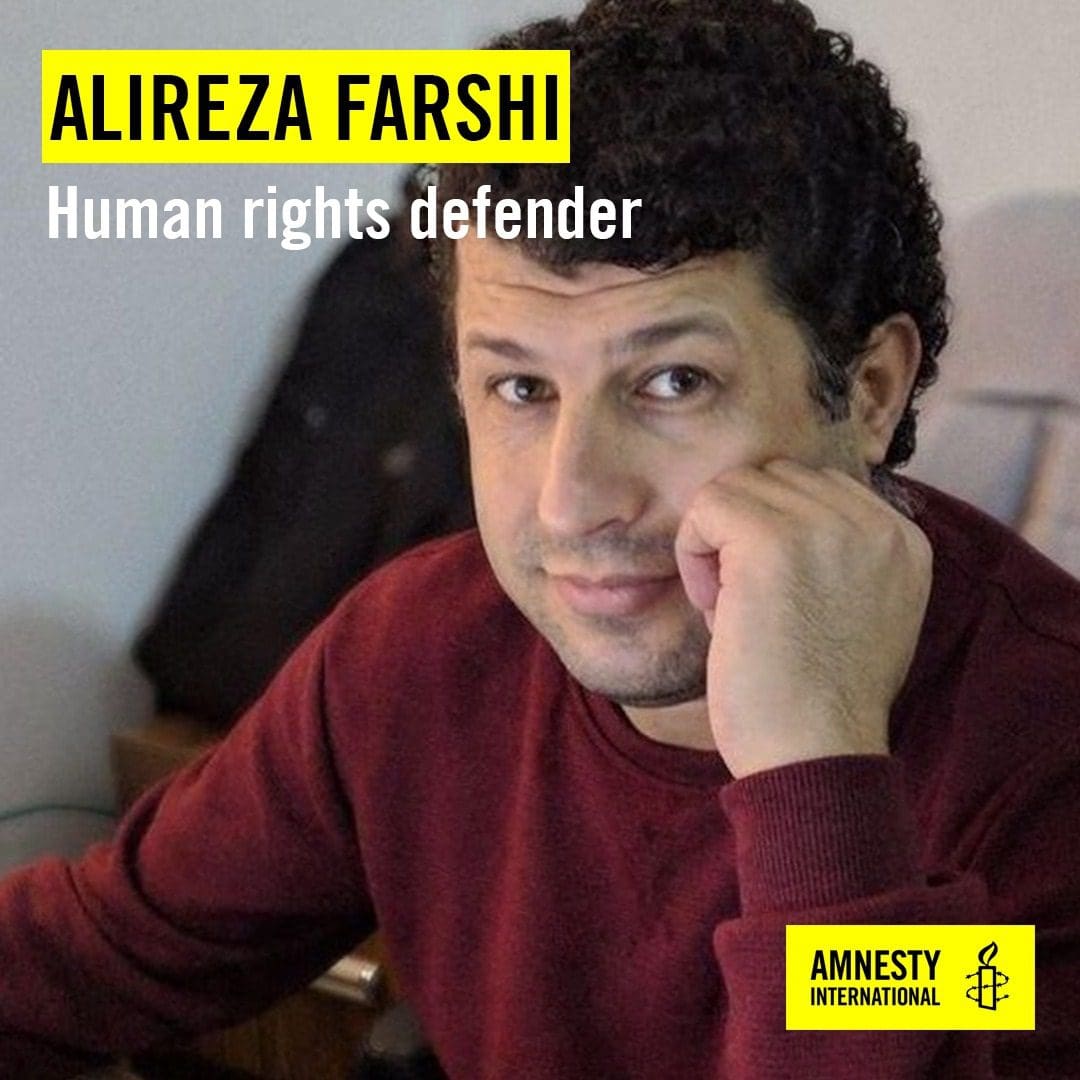

His Excellency Gholamhossein Mohseni Ejei
c/o Permanent Mission of the Islamic Republic of Iran
622 Third Avenue, 34th Floor
New York, NY 10017
Email: [email protected] or [email protected]
PERsecution of Labor Activists
For more than a year, since International Workers’ Day in 2018, Amnesty International has documented the arrests of hundreds of workers and other labor rights activists in the context of a campaign by the authorities to repress social unrest and public dissent. Courts have handed down prison sentences to dozens of them, in at least 38 cases compounding these by ordering those convicted to be flogged as well.
The Iranian authorities should also initiate impartial, independent and effective investigations into allegations that some labor rights activists, including Esmail Bakhshi and Sepideh Gholian, whose testimonies Amnesty International has documented in detail, have been tortured or otherwise ill-treated in detention in recent months. Anyone found responsible should be brought to justice in trials that meet international fair trial standards.
On May Day (May 1) 2019 Iranian authorities arrested large numbers of labor rights activists for taking part in peaceful protests. The organization renews its calls on the Iranian authorities to lift their unlawful ban on independent trade unions and allow workers to hold peaceful gatherings, including on International Workers’ Day, and to exercise their right to form and join independent trade unions.
Press Release on Abuse of Labor Activists
Relevant Links
- Draconian campaign to enforce compulsory veiling laws
- Iran: Executions of protester with mental disability and tortured Kurdish man
- Forcibly disappeared men risk secret execution
- Risk of protest-related executions amid killing spree
- Nobel Peace Prize winner Narges Mohammadi must be released immediately
- Iranian authorities must stop harassing grieving families of killed protesters
- Women and girls in Iran are being subjected to increased oppression
- Global action to stop the executions spree in Iran
- Urgent action on protesters sentenced to death
- Executions of tortured protesters
- Millions of schoolgirls at risk of poisoning
- Children arrested during protests subjected to torture in custody
- Three young men brutally tortured in custody face execution
- 28 People risk execution in relation to protests in Iran
- At least 21 people face death penalty in sham trials over public protests
- Joint statement calls for UN Human Rights Council to hold session on Iran
- Evin prisoners brutally attacked during fire
- At least 23 children violently killed during protests in Iran
- Leaked document reveals Iran authorities brutal crackdown plan
- Iran authorities unleash brutal crackdown against those protesting death of Mahsa Amini
- Iranian LGBTQI defender sentenced to death
- Iran’s militarized response to May 2022 protests
- Alarming fast pace of executions in Iran in first half of 2022
- Iranian-Kurdish mother and baby denied proper care in detention
- Ahmadreza Djalali at risk for retaliatory execution
- Iranian authorities responsible for dozens of deaths in custody
- joint statement on persecution for protesting authorities’ killing of family members during November 2019 protests
- Joint statement on restrictive cyberspace law
- Amnesty launches Persian language website
- Execution of juvenile offender underscores need to reform penal code
- Details of 323 people killed by security forces in November 2019
- Unjustly Detained Students Beaten in Custody
- Iran: People’s tribunal on deadly protest crackdowns must serve as wake-up call
- Suspicious Death in Custody of Witness to Torture
- Iran: Failing on All Fronts
- Detained Academic Ahmadreza Djalali needs medical attention
- Nasrin Sotoudeh’s letter to her children from prison
- Release women’s rights activists arrested for protesting against forced veiling
- Nowruz Action 2020
- Urgent Action on detained conservationists
- Amnesty International statement on Iran to the 40th session of the UN Human Rights Council
- For more information visit the Amnesty.org Country page
Downloads
- Nowruz Action 2021
- Nasrin Sotoudeh
- Ahmadreza Djalali
- Ahmadreza Djalali
- Alireza Farshi
- Haftsin table
- juvenile executions
- juvenile offender Arman Abdolali
- Arman Abdolali
- Abdolali juvenile offender
- Nowruz Action 2022
- Zahra Sedighi-Hamadani
- Mahsa Amini
- Nowruz action 2023
- Children tortured in custody
- Farhad and Reza with their button
- I Oppose Mandatory Hijab
- Toomaj Salehi
- Iran-UN-Plaza-September-2023-scaled.jpg
- Iran-one-year-anniversary.png
- Iran-sexual-assault-2.jpg
- Nowruz-action-2024.pdf
- Nowruz-2024-collage-1.png
- Iran-executions-report-2024.jpg
- Bayani.jpg

